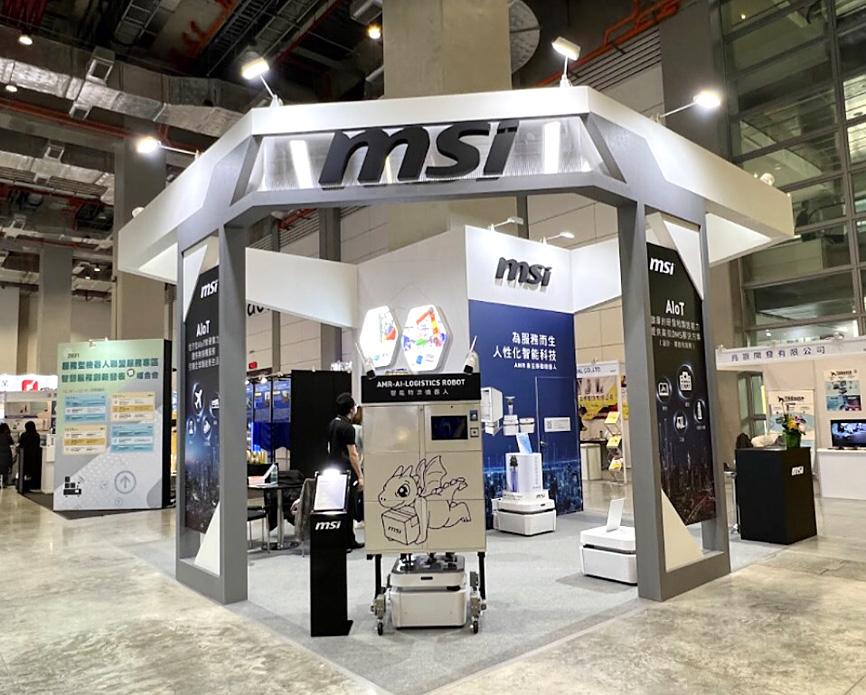Micro-Star International Co (MSI, 微星科技) yesterday said it has canceled plans to attend next month’s Consumer Electronics Show (CES) in Las Vegas, Nevada, possibly making it the first Taiwanese firm to pull out of physically attending the annual event due to concern over COVID-19.
MSI became the latest company to join several global brands in scrapping plans to attend the CES show as the Omicron variant of SARS-CoV-2 rapidly spreads throughout the US.
Earlier, Google, Intel Corp, General Motors Co, Amazon.com Inc, Meta Platforms Inc, Twitter Inc, Pinterest Inc, Lenovo Group Inc (聯想) and AT&T Inc announced that they had canceled attending the show in person.

Photo courtesy of Micro-Star International Co
CES, which is to be held from Wednesday to Saturday next week, is the first global tech event after Christmas.
“Since December, the rapidly spreading Omicron variant has led to a surge of COVID-19 cases in the US. The health and well-being of our employees, customers and fans are our top priority,” MSI marketing vice president Sam Chern (程惠正) said in a news release. “Hence, we have decided not to participate in person at CES 2022 and will join the show virtually with our online product launch.”
MSI, which makes gaming computers, graphics cards and motherboards, said that its lineup of products for next year would be showcased online.
The company plans to hold two virtual events — MSI Gamerverse on Tuesday next week and MSI-VERSE the following day — to introduce its new gaming, content creation, business and productivity lineups, along with new peripherals and components for next year, the release said.

Real estate agent and property developer JSL Construction & Development Co (愛山林) led the average compensation rankings among companies listed on the Taiwan Stock Exchange (TWSE) last year, while contract chipmaker Taiwan Semiconductor Manufacturing Co (TSMC, 台積電) finished 14th. JSL Construction paid its employees total average compensation of NT$4.78 million (US$159,701), down 13.5 percent from a year earlier, but still ahead of the most profitable listed tech giants, including TSMC, TWSE data showed. Last year, the average compensation (which includes salary, overtime, bonuses and allowances) paid by TSMC rose 21.6 percent to reach about NT$3.33 million, lifting its ranking by 10 notches

Popular vape brands such as Geek Bar might get more expensive in the US — if you can find them at all. Shipments of vapes from China to the US ground to a near halt last month from a year ago, official data showed, hit by US President Donald Trump’s tariffs and a crackdown on unauthorized e-cigarettes in the world’s biggest market for smoking alternatives. That includes Geek Bar, a brand of flavored vapes that is not authorized to sell in the US, but which had been widely available due to porous import controls. One retailer, who asked not to be named, because

SEASONAL WEAKNESS: The combined revenue of the top 10 foundries fell 5.4%, but rush orders and China’s subsidies partially offset slowing demand Taiwan Semiconductor Manufacturing Co (TSMC, 台積電) further solidified its dominance in the global wafer foundry business in the first quarter of this year, remaining far ahead of its closest rival, Samsung Electronics Co, TrendForce Corp (集邦科技) said yesterday. TSMC posted US$25.52 billion in sales in the January-to-March period, down 5 percent from the previous quarter, but its market share rose from 67.1 percent the previous quarter to 67.6 percent, TrendForce said in a report. While smartphone-related wafer shipments declined in the first quarter due to seasonal factors, solid demand for artificial intelligence (AI) and high-performance computing (HPC) devices and urgent TV-related orders

MINERAL DIPLOMACY: The Chinese commerce ministry said it approved applications for the export of rare earths in a move that could help ease US-China trade tensions Chinese Vice Premier He Lifeng (何立峰) is today to meet a US delegation for talks in the UK, Beijing announced on Saturday amid a fragile truce in the trade dispute between the two powers. He is to visit the UK from yesterday to Friday at the invitation of the British government, the Chinese Ministry of Foreign Affairs said in a statement. He and US representatives are to cochair the first meeting of the US-China economic and trade consultation mechanism, it said. US President Donald Trump on Friday announced that a new round of trade talks with China would start in London beginning today,